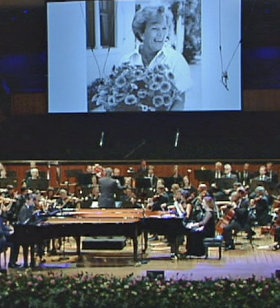Reflections on Hazel Hawke

 Today, as I write this, a commemoration service is being held for Hazel Hawke at the Sydney Opera House. She died recently of complications after suffering Alzheimer's disease. A remarkable woman, she is loved by many for her openness about having been diagnosed with dementia.
Today, as I write this, a commemoration service is being held for Hazel Hawke at the Sydney Opera House. She died recently of complications after suffering Alzheimer's disease. A remarkable woman, she is loved by many for her openness about having been diagnosed with dementia.
"She had this mantra, 'we've got to fight stigma and raise money through research, we've got to beat this bloody thing'. I heard it many a time.
Sue Peters-Hawke
Her frank admission did much to bring this difficult topic into the spotlight. Her condition highlighted to many the plight of sufferers and carers.
For someone like myself, who has turned 50 and has ageing friends and family, dementia is a genuine evil.
Dementia
Dementia is evil because it robs us of all the things that make life meaningful.
If life is a journey, then a good life is one marked by progress and achievement, and by wonderful experiences and relationships. But dementia, if we suffer it, will cause us to regress. And all our achievements, experiences, and relationships will be forgotten.
If life can be imagined as a journey by ship, then dementia will leave us alone on a featureless ocean, without chart, log, or compass.
Is life meaningful?
For me, dementia raises the question of whether life can be meaningful. Is my life meaningful if a disease like dementia can prevent me from reflecting on my own achievements?
As many testified today, Hazel's life was significant as a wife, mother, political figure and in many other ways. But the significance of that would have been lost to Hazel at some point in the progress of her disease. And the memory of Hazel will be lost to those who loved her as they too age and die.
"It's said that you're lucky if you have a compass to hand that always points true, a voice that guides you in the direction of your most profound values and towards the best of what is possible. For me, that voice was Hazel."
Sue Peters-Hawke
Many Australians are in two minds about the world. Many want to affirm that life has meaning, purpose and value, and yet profess to only believe in what we can see, hear, and touch. We're generally skeptical of any claims about the supernatural.
The philosophers call this view of the world 'naturalism'. The problem with naturalism is how to find meaning in life. Dementia might rob life of meaning, but naturalism implies that life itself is ultimately meaningless.
Returning to the analogy of a journey by ship, naturalism, like dementia, leaves us alone on a featureless ocean, without chart, log, or compass. However, unlike dementia, naturalism leaves our faculties intact.
Naturalism
Naturalism is the view that only natural laws and forces operate in the world. This view suggests either there is no God, or if there is he is far from us. The problem with naturalism is that natural laws and forces are blind to us and indifferent to our goals and aspirations.
If there is only matter, if there is no God, if the universe is blind and indifferent to us, then all our hopes are merely chemical states in our brains. Even if scientists can map "happiness" to levels of serotonin and dopamine, the universe just doesn't care.
I'm not suggesting that naturalists themselves don't care. Two atheists I know care deeply: one promotes vaccination against disease, and the other agitates for the control of the spread of malaria. These guys are passionate about these issues, but this is despite their naturalism, not because of it. I agree with them that a world without measles is a better place, but that's because I'm human. The laws governing relativity, thermodynamics etc don't care if humans eradicate malaria or are ravaged by it.
If dementia robs us of our experience of a meaningful life, then naturalism robs us of the possibility of having a meaningful life.
If naturalism is true, then Hazel Hawke's achievements are meaningless. But my humanity won't allow me to accept that.

